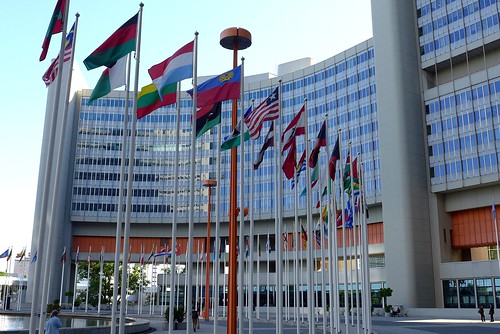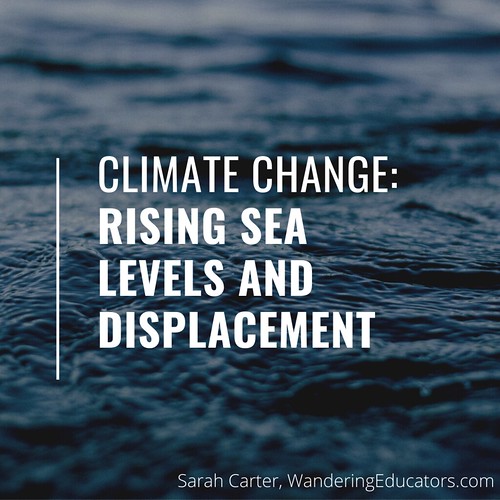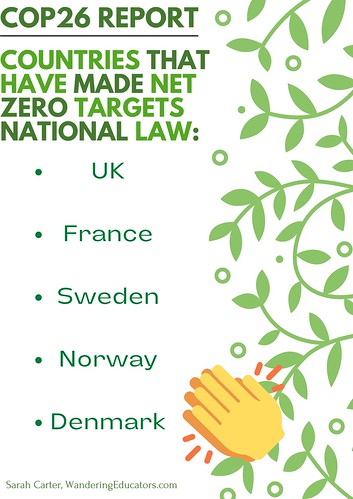Between October 31st and November 12th 2021, a pivotal event is taking place that will determine how the world will continue to tackle climate change. The United Kingdom is hosting the 26th
United Nations Climate Change Conference, known as COP26. This marks a crucial point in climate change history that will determine ‘
whether generations look back at this time with admiration or despair.’
This article will summarise the origins of COP26, as well as highlight the key aims that it needs to achieve.
What is the Paris Agreement?
In 2015, 196 parties came together to create the
Paris Agreement. It is a legally binding agreement to keep global warming below
1.5 degrees Celsius. When the agreement was made, targets estimated that by 2100 global warming would be well over a terrifying 3 degrees. Despite recognising this threat, global emissions still need to be reduced by at least 50% to achieve the
below 1.5 goal. However, emissions have never decreased by even 15% per year, and
countries like Australia and California are already on fire.
Whether this is solved or not will determine the overall success of COP26.
The Paris Agreement is especially significant due to its first-of-a-kind nature: pulling together all nations in pursuit of a common cause that battles climate change. However, COP26 is not just a get-together. All attending countries need to be serious and ready for immediate action in their endeavours to achieve the Paris Agreement.
What is United Nations Framework Convention on Climate Change?
The UN Framework Convention on Climate Change (1992) focuses on dangerous human interference with climate change and how–globally–we can prevent and stop this. It is a legally binding treaty that places responsibility on the 154 states that signed it to work towards how they can reduce their climate impact.
Why is COP26 so important?
The
past decade has witnessed the warmest temperatures ever recorded. Fossil fuel emissions created by humans are increasingly causing extreme weather events, rising sea levels, and land ice to melt. The current climate crisis demands attention like never before. This is why governments around the world are meeting in Glasgow, Scotland, to discuss how they will tackle climate change head on.
‘
COP26 simply can’t be another talking shop.’ Actions speak louder than words, and in this case, words without action are not an option. Climate change is only set to worsen—and what we do now will determine the lives and livelihoods of future generations.
The significance of COP26 is that it could be the last chance that we have to stop climate change causing immeasurable and irreversible damage to our planet.
The 4 Goals of COP26
There are four key goals that must be met at COP26. These goals were decided in Paris 2015 by all attending governments and leaders...and COP26 needs to make them a reality.
Goal #1:
‘Secure global net zero by mid-century and keep 1.5 degrees within reach’
Currently, far too many countries are not serious enough about achieving net zero. For this reason, it is important for COP26 to emphasise how vital it is to achieve this goal before 2050. To do this, countries need to stop the use of coal, reduce deforestation, encourage the use of electric vehicles, and strengthen expenditures in renewables.
Goal #2:
‘Adapt to protect communities and natural habitats’
The effects of climate change have already damaged–and are continuing to damage–whole communities and ecosystems.
Weather events like hurricanes, wildfires, droughts, high winds, and flooding are happening more often and on
an extreme scale because of climate change. Since 2020, fatal floods in South Asia have led to 12 million people being forced from their homes. In recent years, floods have also put a third of Bangladesh underwater during monsoon season. These extreme weather events have
serious ramifications for human and animal life. They destroy crops and food sources, forcing many people into vulnerable situations where they experience homelessness, and sometimes statelessness.

While these are just two examples of how climate change is damaging whole communities and ecosystems, they highlight
why we must adapt to protect communities and natural habitats. Some countries have already begun projects to protect natural habitats. A prominent example can be seen in the UK in Wales, where
Project Seagrass aims to restore this valuable plant. It is a perfect example of how ‘
nature-based solutions can help fight climate change.’
However, governments need to do more to prevent, protect, and restore. They need to create defence systems and infrastructure that will stop people losing their livelihoods, and in some cases, their lives. COP26 aims to reinforce this and help make it an achievable goal worldwide.
Goal #3:
Mobilise finance
Of course, to be able achieve the first two mentioned goals, there must be financial backing. This is especially significant for developing countries, who will face financial obstacles when trying to protect themselves from the effects of climate change. Therefore, COP26 aims to place responsibility on more developed countries to mobilise ‘climate finance’ to support developing countries.
This goal understands
the disproportionate effects of climate change. More specifically, how it is the countries that are least developed that are on the frontlines of the climate crisis. This is because ‘
poverty and climate change are inextricably linked.’
Climate vulnerability is defined by insufficient resources, funds, and overall ability to respond to the effects of climate change. It is also determined by a country’s geographic location. For example, countries situated in warmer/tropical parts of the world are at
high risk of tsunamis, hurricanes, and cyclones. These countries include Haiti, Yemen, Sri Lanka, and Kiribati—all of which have already suffered immeasurably from the effects of climate change, and have
under-developed economies. Countries with more developed economics tend to be in colder parts of the world, where warmer weather is welcomed, and extreme weather events are far less frequent, if at all.
Therefore, COP26 needs to place primary responsibility for mobilising finance on the world’s most developed countries. We must stop climate change worsening existing inequalities.
We as human beings need to fight climate change as a collective—and we cannot do this unless those who are suffering the most are supported financially.
Goal #4:
Work together to deliver
The final goal of COP26 is indispensable to achieving the other 3 goals. By bringing together all UN parties, COP26 emphasises the importance of all nations working as one to fight climate change.

This is important because it is only when we truly listen to those who are suffering the most from climate change that we can begin to understand how each nation can support one another during the climate crisis. Due to the effects of climate change being felt unevenly across the globe, this is putting a further strain on international relations.
COP26 will give a voice to those nations that are facing the worst consequences of our collective actions, allowing them to be heard internationally.

Nations must use COP26 to work cooperatively together and accelerate meaningful change. The leaders of our world have been presented with a decisive opportunity for future generations, and we must ensure that they take it up.
What Can You Do?
Everyone has a role in the battle against climate change. While it is paramount that the world leaders work together to fight climate change on an international scale, each person must do their part. The enormous undertaking of the COP26 goals will only be successful if it gets individuals within each nation to do their bit. Whether you are in Glasgow, the UK, or anywhere in the world, you need to be a part of this historical event.
Here’s how:
Attend virtual events:
Climate Emergency Newsroom
Date: Monday 01 November 2021-Friday 12 November 2021
Time: 09:00-15:00
Revisiting consumption for a climate friendly future. In conversation with Professor Tim Jackson
Date: Wednesday 18 August 2021-Thursday 18 August 2022
Time: 09:00
Carbon Cost Calculathon
Date: Tuesday 05 October 2021-Monday 10 January 2022
Time: 10:00
Or find more at: https://www.gla.ac.uk/explore/sustainability/events/online/
Educate yourself:
Read online updates at: https://ukcop26.org/news/
Watch related movies:
o In Your Palm
o Youth Unstoppable: Another World is Possible
o Call Me Priya
o Big Men
o UK: Europe’s Biggest Lie
Follow conservation social media accounts:
o projectseagrass (Instagram)
o oceanramsey (Instagram)
o thewcs (Instagram)
o Wildlife Conservation and Environmental Issues (facebook)
o SEA LIFE Trust ANZ (facebook)
‘History has shown us that when nations come together in common cause, there is always room for hope. Working side by side, we have the ability to solve the most insurmountable problems and to triumph over the greatest of adversities.’ ~The Queen’s speech at the COP26 Evening Reception’ (ROYAL UK 2021)
Everyone should see COP26 as an opportunity.
While world leaders have an important role in the climate crisis, so do you. The climate crisis offers everyone an opportunity to become a leader of your own community. We cannot wait any longer. Do the right thing and take up this opportunity to make meaningful change, and allow your children, grandchildren, and great grandchildren to live in a world that has a future.

Climate Change articles in this series:
Linking Human Rights and Climate Change

Climate Change and Inequality: Does Climate Change Discriminate?

Climate change: Rising sea levels and displacement

Sarah Carter is the Human Rights and Climate Change Editor at Wandering Educators. She is currently studying a Master’s in Human Rights and Diplomacy at the University of Stirling. She is motivated by a desire to make a change in this world.


































